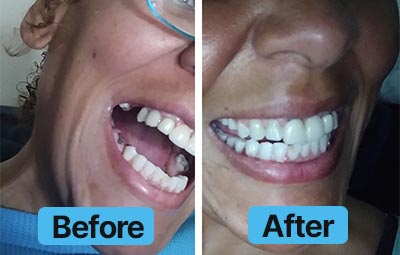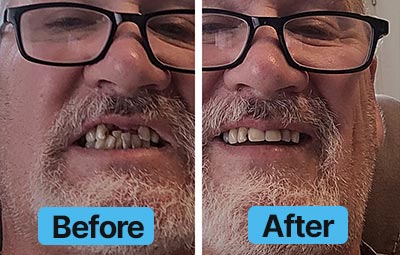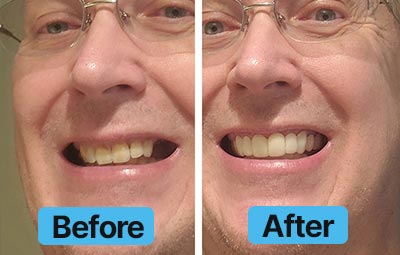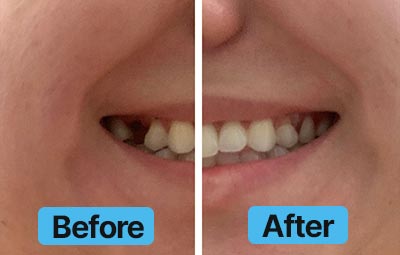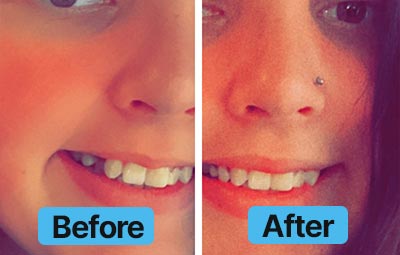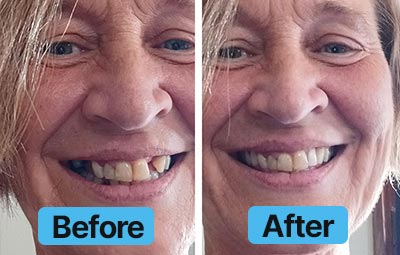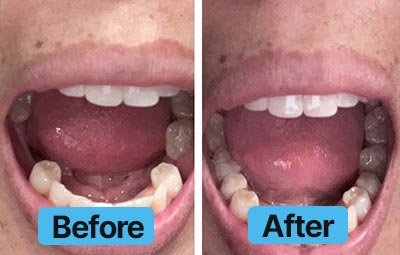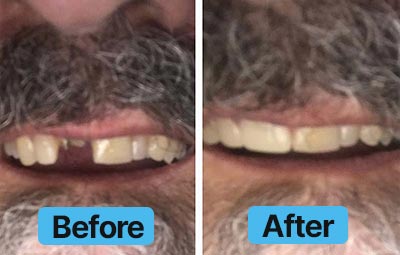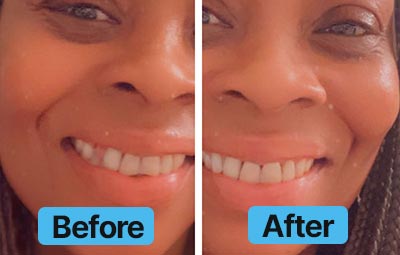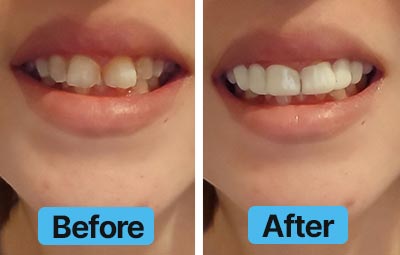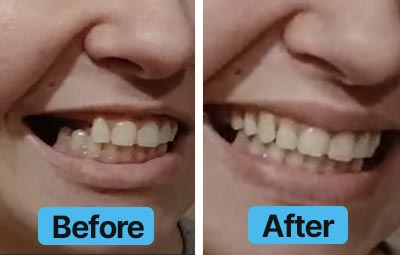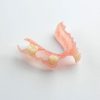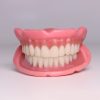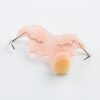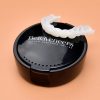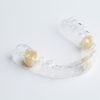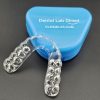Dentures are meant to fit comfortably so that you can smile and speak with the confidence you deserve. Unfortunately, when your dentures don’t fit right, it can lead to a host of problems like sore gums, poor nutrition, and even health issues.
More than 40 million Americans rely on their dentures, so making sure the dentures fit correctly is so incredibly important, and we want to help you learn how to identify what a bad fit looks like.
Below are five common signs of a poor denture fit, and what you should do about each.
5 Signs of Poor Dentures Fit
1. Sore Spots, Irritated or Swollen Gums
Dentures that rub or press on the gums can cause painful sore spots, inflammation, or even ulcers on the soft tissues. You might notice red, irritated areas on your gums or the roof of your mouth. Persistent gum pain or sores are a clear signal that your dentures aren’t fitting properly. Ill-fitting dentures can even lead to infections like denture-related stomatitis if not addressed.
Healthy dentures should feel comfortable (after a short adjustment period). Frequent pain is not normal. If you’re experiencing pain, we put together 5 tips for managing sore spots with new dentures.
2. Dentures Feel Loose or Keep Slipping
If your dentures frequently slip, wobble, or fall out when talking or eating, the dentures’ fit is probably too loose for you.
Well-fitting full dentures normally stay in place with a natural suction on the upper palate or a close fit along the gums. Dentures that don’t fit right may float or move around, and you might find yourself subconsciously biting down or clenching to keep them in place.
A telltale sign is needing to reposition your dentures often or fear they’ll drop when you cough or laugh.
Over time, bone and gum changes can make dentures loose, even if they once fit well. This is to be expected with heavy usage over multiple (many, many, many) years. If this applies to you, you’ll need to get a new pair of dentures.
3. Relying Heavily on Denture Adhesive
Don’t get us wrong, denture adhesive can be very useful… in moderation. But it should not be the primary thing holding ill-fitting dentures in place. If you’re applying a thick layer of adhesive or reapplying it multiple times a day just to get your dentures to stay put, that’s a big red flag that you need new dentures.
If this happens to you, the American College of Prosthodontists recommends having a dentist evaluate your dentures if adhesives are required constantly to eat or socialize (when dentures won’t stay in by themselves).
A properly fitting denture usually needs only a thin film of saliva or a touch of adhesive, not gobs of it oozing out. Using excessive adhesive to compensate for poor fit is not a long-term solution and could mask underlying fit problems.
4. Difficulty Chewing or Biting Food
When you first try eating with dentures, you might notice it’s a bit difficult. It’s normal to have a short adjustment period with new dentures, but after a few weeks, you should be able to chew comfortably.
If you struggle to chew foods that used to be easy, or if you avoid certain foods you should be able to eat with dentures, they may not be fitting or functioning as they should.
Signs include pain, a clicking sound when biting, inability to bite through foods, or dentures moving when you chew.
A poor fit can reduce your bite force significantly, making it hard to eat a balanced diet, and over the long term, not being able to chew properly can lead to nutritional deficiencies.
5. Trouble Speaking Clearly (Persistent Lisp or Clicking)
Dentures that don’t fit right can affect your speech. You might develop a lisp, slur certain words, or notice clicking noises when you talk. Some patients find their dentures “float” or shift when speaking, causing them to mumble or feel self-conscious.
While it’s normal to take a little time to relearn some pronunciations with partial dentures and full dentures, ongoing speech problems are a concern.
Consistent speech pattern changes that do not resolve after the initial adjustment timeline are one sign that your false teeth may need an adjustment or re-fit.
What to Do About Ill-Fitting Dentures
If you recognize any of these signs of poor dentures fit, don’t ignore them because there are solutions.
Get in Touch with your Dentist
can often reline or adjust your dentures so that they conform better to your gums, or recommend if it’s time for a new set. Our mouths change over time (gums can shrink and bone can recede), so dentures that fit a few years ago might need an update now.
Wear Adhesives
Denture adhesives are a great solution for minor slips or discomfort. But if you find yourself relying on adhesives every day just to keep them in place, it may be time for new dentures.
Try Quick Reline
Quick reline refreshes the inside surface of your dentures by creating a softer cushion and better grip on your gums. It’s a fast and affordable way to improve comfort and reduce slipping without a full replacement. Relines help extend your denture’s life while making daily wear much more comfortable.
Get New Dentures
If your dentures constantly slip or feel uncomfortable, it might be time for new ones. Our affordable DIY Easy Dentures replace all missing teeth, while partial dentures fill in a few gaps. A fresh set restores comfort, stability, and confidence, helping you eat, speak, and smile without constant adjustments.
Fix Your Dentures Fit Today
Your dentures should enhance your quality of life, not detract from it. Sore gums, loose teeth, difficulty eating or speaking are all signs your dentures fit isn’t right. Don’t “tough it out” or overuse adhesives to jury-rig a bad fit.
Explore convenient replacement options with Dental Labs Direct to restore your comfort and confidence!
With a proper fit, you’ll be able to smile, eat, and talk, keeping your oral health and comfort on track. Well-fitting dentures are essential for a healthy and happy smile!
 60 DAY warranty on all custom-made products | 1,000+ 5 Star ★★★★★ Reviews
60 DAY warranty on all custom-made products | 1,000+ 5 Star ★★★★★ Reviews

